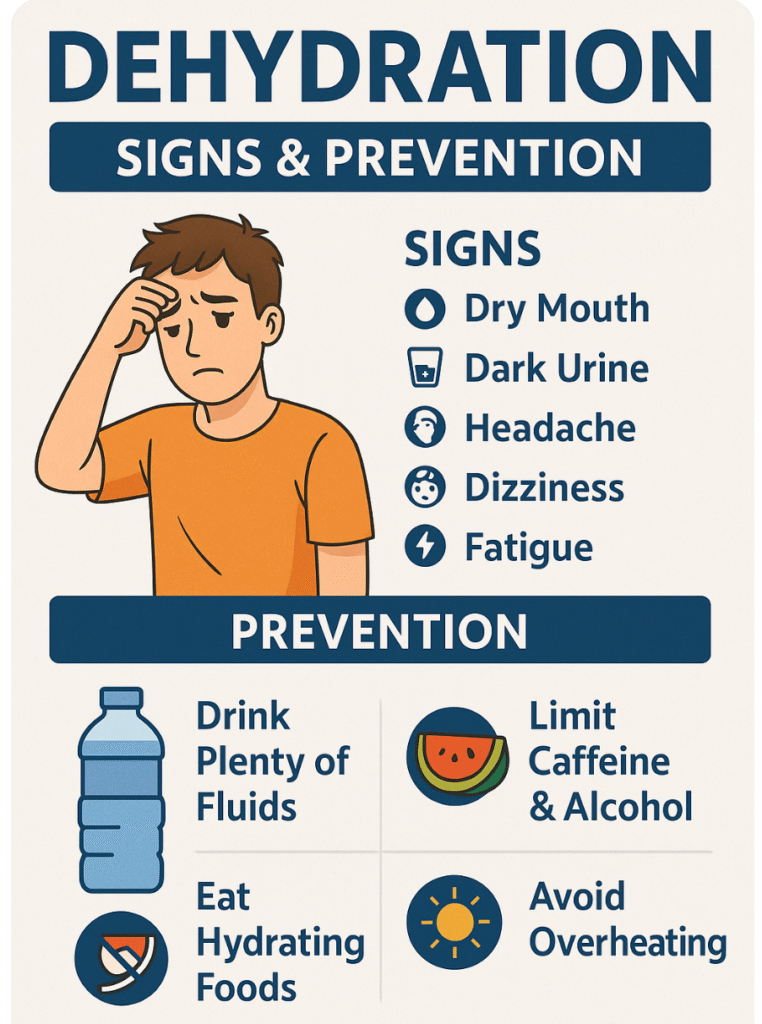Introduction
Water is essential to life. It makes up roughly 60% of the human body and plays a vital role in regulating temperature, transporting nutrients, lubricating joints, and supporting every cellular process. Yet, dehydration — a condition in which the body loses more fluids than it takes in — remains one of the most overlooked health issues worldwide.
According to the World Health Organization (WHO), even mild dehydration (a fluid loss of just 1–2% of body weight) can impair mood, concentration, and physical performance. Chronic dehydration, on the other hand, can lead to serious complications such as kidney stones, urinary tract infections, and electrolyte imbalances.
This article explores the causes, warning signs, and prevention of dehydration, guided by medical research and practical health advice.
What Is Dehydration?
Dehydration occurs when the body lacks sufficient water to perform normal functions. This imbalance can happen due to insufficient fluid intake, excessive sweating, diarrhea, vomiting, fever, or certain medical conditions that increase water loss.
The Body’s Water Balance
Water loss happens continuously through breathing, perspiration, urination, and bowel movements. Normally, this loss is replenished by drinking fluids and consuming water-rich foods. When intake fails to meet the body’s demands, dehydration develops.
Common Causes of Dehydration
- Inadequate Fluid Intake – Forgetting to drink water throughout the day is one of the most common causes.
- Excessive Sweating – Exercise, hot climates, or fever can cause significant fluid loss.
- Illness or Infection – Vomiting, diarrhea, and high fevers rapidly deplete water and electrolytes.
- Medications – Some diuretics or blood pressure drugs increase urine output.
- Alcohol and Caffeine Consumption – Both act as diuretics, increasing fluid loss.
Warning Signs of Dehydration
Early recognition is key. The body provides several indicators that it needs water:
- Dry mouth and throat
- Dark-colored urine (a sign of concentrated waste)
- Headache and inability to focus
- Dizziness or lightheadedness
- Fatigue or muscle weakness
- Rapid heartbeat or breathing in severe cases
In infants and older adults, dehydration can occur more quickly and may present differently, such as irritability, confusion, or reduced urine output.
Health Risks of Chronic Dehydration
Over time, insufficient hydration can impact nearly every organ system:
- Kidneys: Reduced ability to filter toxins and regulate electrolytes.
- Heart: Increased strain as blood volume decreases.
- Skin: Dryness and loss of elasticity.
- Cognitive Function: Decreased alertness and memory retention.
- Digestive System: Constipation and acid reflux.
How to Prevent Dehydration
Preventing dehydration is simple but requires consistency and awareness.
1. Drink Plenty of Fluids
Aim for 2–3 liters of water per day, adjusting for temperature, body weight, and physical activity. Don’t wait until you feel thirsty — by that time, mild dehydration has already begun.
2. Eat Hydrating Foods
Include fruits and vegetables with high water content such as cucumbers, watermelon, lettuce, oranges, and tomatoes. These foods also supply essential vitamins and minerals lost through sweat.
3. Limit Caffeine and Alcohol
Reduce diuretic beverages like coffee, tea, and alcohol, especially in hot weather. Replace them with water or electrolyte-rich drinks.
4. Avoid Overheating
Wear breathable clothing and take breaks in shaded or cool areas when exercising or working outdoors.
5. Use Electrolyte Drinks When Necessary
During intense physical activity or illness, replenish electrolytes (sodium, potassium, magnesium) to maintain proper hydration balance.
When to Seek Medical Attention
If dehydration symptoms persist despite fluid intake, seek medical care immediately. Severe dehydration can lead to confusion, rapid pulse, fainting, or shock — requiring intravenous (IV) fluid replacement.
Conclusion
Dehydration might seem trivial, but it profoundly affects both short-term performance and long-term health. By making hydration a daily priority and being mindful of your body’s needs, you can support your immune system, heart, and brain — and feel more energetic every day.
Drink water not just to survive, but to thrive. 💧
🇰🇷 Premium Korean Ginseng Online Shop







